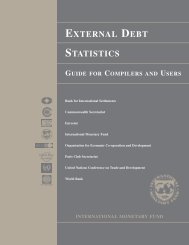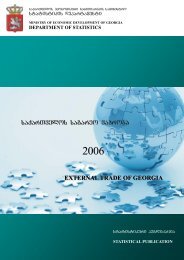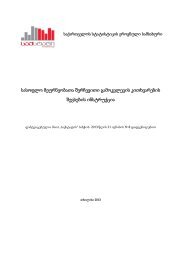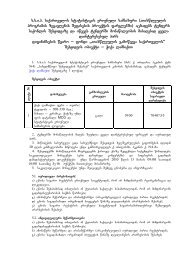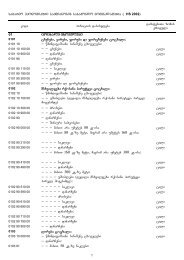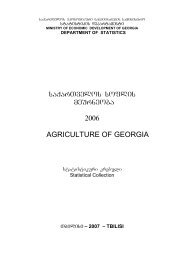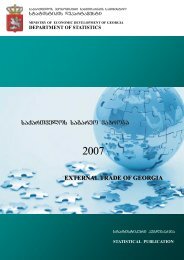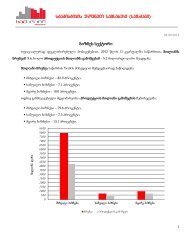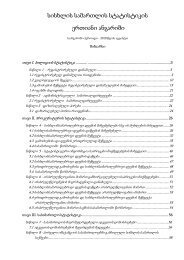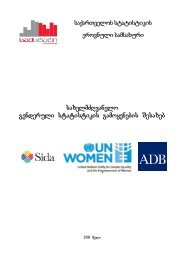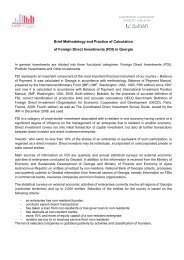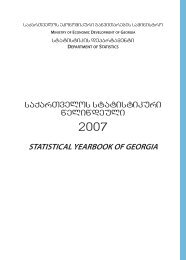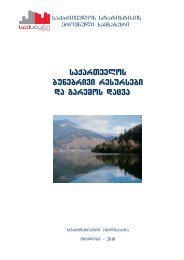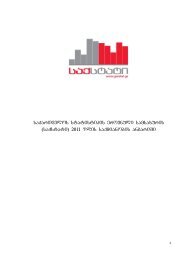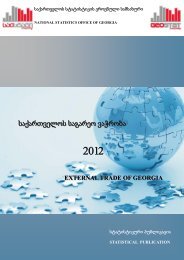external trade of georgia
external trade of georgia
external trade of georgia
Create successful ePaper yourself
Turn your PDF publications into a flip-book with our unique Google optimized e-Paper software.
Short describing methodology<br />
External <strong>trade</strong> statistics data are collected according to recommendations <strong>of</strong> United Nations Statistics<br />
Department “International Merchandise Trade Statistics” (United Nations, New York, 2004).<br />
For External Trade Georgia uses the “general method”, which means that crossing a border <strong>of</strong><br />
the economic territory <strong>of</strong> the country is the main criterion for determining exports and imports.<br />
Export implies both the export <strong>of</strong> domestic production and the reexport <strong>of</strong> imported goods.<br />
Import implies importing <strong>of</strong> the production and reimport <strong>of</strong> imported goods.<br />
Export is valued at FOB prices, are used to value export i.e. prices at the border <strong>of</strong> the exporting<br />
country (this term means that the seller’s obligation to deliver is fulfilled when the goods have passed<br />
over the ship’s rail at the named port <strong>of</strong> shipment), while import is valued at CIF prices, that is, transportation<br />
costs to the border <strong>of</strong> the importing country included in the prices as well as insurance<br />
costs.<br />
There are following criteria to determine the partner country: for imports the country <strong>of</strong> origin or<br />
the sending country, while for exports the country <strong>of</strong> destination.<br />
Database <strong>of</strong> Customs Declarations (DBCD) is the main information source on <strong>external</strong> <strong>trade</strong><br />
transactions. National Statitics <strong>of</strong>fice (NSO) receives DBCD monthly from Revenue Service <strong>of</strong> Ministry<br />
<strong>of</strong> Finance <strong>of</strong> Georgia. Information on <strong>external</strong> <strong>trade</strong> by motor cars is provided additionally by<br />
the Service Agency <strong>of</strong> the Ministry <strong>of</strong> Internal Affairs, on gas and electric power is obtained from<br />
corresponding sources, to complete the data.<br />
Based on obtained information, NSO carries out the following activities:<br />
- Checks DBCD – commodity codes, prices, weights, dates <strong>of</strong> customs declarations, country<br />
codes for origin/destination, non-existent codes <strong>of</strong> country and commodity;<br />
- Controls the limits on prices main commodities and adjusts quantities or prices or supplementary<br />
unit;<br />
- Removes from the database commodities which according to internationally approved methodology<br />
should not be classified as <strong>external</strong> <strong>trade</strong> in goods (securities, bank notes and coins in circulation;<br />
diplomatic and other analogous goods).<br />
“Commodity Nomenclature for External Economic Activities” founded on the Harmonized<br />
Commodity Coding and Description System, is used during the registration <strong>of</strong> the border crossing<br />
transactions.<br />
The value indicators are given in USD. The calculation <strong>of</strong> the statistical value in USD is carried<br />
out by customs services during the registration <strong>of</strong> Customs Declarations according to the <strong>of</strong>ficial exchange<br />
rate established by the Interbank Monetary Exchange at the moment <strong>of</strong> the registration.<br />
10



